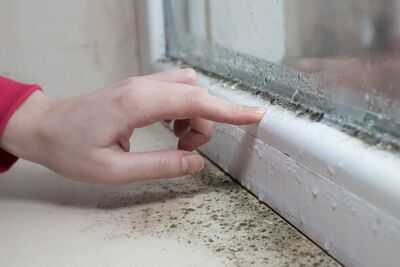Condensation on windows is a highly common issue that many struggle with in various types of properties, including houses and flats. This problem tends to be especially severe during late autumn and winter when the warm air inside the home meets the cold glass of the windows, resulting in condensation that creates moisture and water droplets on your windows, which can lead to dampness and mould. Bedrooms are particularly affected by this issue, as moisture from your breath and body heat can build up in the room while you sleep, contributing to the formation of condensation.
Taking to the Mrs Hinch Cleaning Tips Facebook page, one group member asked for advice on what she could do to "put a stop" to the daily occurrence of window condensation. While some recommended opening windows, the majority of responses seemed to be to wipe windows down with dish soap.

Allison Gibb Annand said: "Simply put a good squish of washing up liquid on a cloth, wipe all over the windows while they're dry, and hey presto, condensation-free windows. Don't ask me how it works, but as someone who grew up in a single-glazed house, I can tell you that it just does."
Brenda McArthur wrote: "Wipe your windows with a cloth and washing up liquid, which helps so much with condensation."
Some users recommended using vinegar too. Sarah Swire said: "Wiping windows with washing-up liquid and vinegar really works. Need to do ours. Definitely helped last year."
Clare Magee commented: "Dry tea towel with a small amount of Fairy Liquid and vinegar - wipe on windows - it will soap up a bit but just leave to dry - put the damp tea towel in a plastic bag and use again next time - should last a couple of days depending on how bad the condensation is."
Experts at Cardiff Window Cleaner LTD also recommended this solution. They said: "If you wake up and find condensation on your bedroom windows, a great way to clear away the condensation and prevent it from coming back is by mixing a homemade solution.
"Simply mix two cups of water and two cups of white vinegar, then add a couple of drops of dishwashing soap."
Pour this mixture into a spray bottle and spray it straight onto your window. How this works is that the white vinegar creates a "protective barrier", and the soap "breaks down the surface tension of the droplets" on your window.
They suggested using a spray bottle to create a very thin protective cover, which will dry up by itself. You can use a sponge or a piece of cloth, but it will take longer to dry, especially if the air is already too humid.
You may also like

Aqeel Khan - Meet the man who molested Australian women cricketers

Trump to depart Malaysia, head to Japan for second leg of Asia tour

From Burn To Break-Even: Meesho Shows Signs Of Turnaround

Scientists call 3I/ATLAS a rare “Black Swan” object as astronomers watch its strange path and possible alien clues

Dreaming of that Rs 25 lakh car? CA says waiting will cost you more. Here's why







